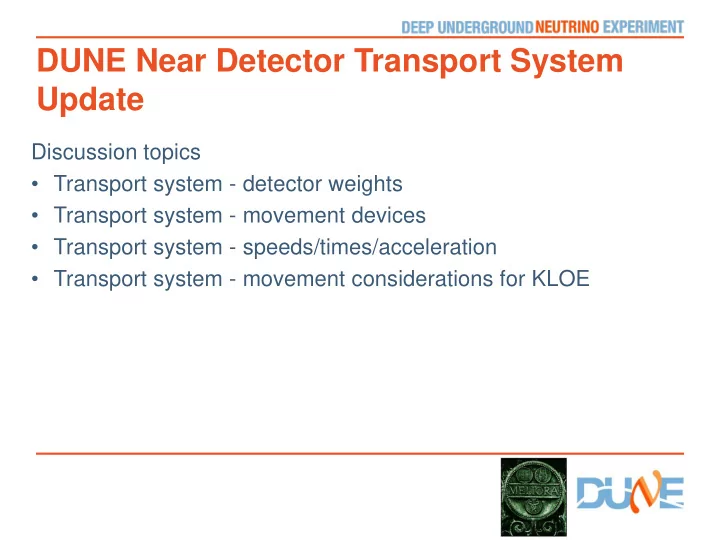

DUNE Near Detector Transport System Update Discussion topics • Transport system - detector weights • Transport system - movement devices • Transport system - speeds/times/acceleration • Transport system - movement considerations for KLOE
Transport system movement detector weights Approximate loads: • LAr detector – 900 tonne • MPD – 800 tonne • KLOE – 900 tonne • 20 tonne of side reaction loads from magnets KLOE 20 tonne side load creates a 33 tonne unequal loading on the MPD transport wheels. Not enough to unseat the wheels LAr Detector 2 September 2019 R. Flight, University of Rochester
Transport system movement plans Use Hilman Powered rollers to move detectors This example shows (6) 100 ton electric motorized roller assemblies moving a 400 ton test load at 1 ft/min for a nuclear waste conversion plant. Our loads are higher and speeds slower. 3 September 2019 R. Flight, University of Rochester
Transport system movement plans Use Hilman Powered rollers to move detectors Guide rollers at the 4 corners are sufficient to handle the 20 ton side loads 4 September 2019 R. Flight, University of Rochester
Transport system movement plans Will it fit? 5 September 2019 R. Flight, University of Rochester
Transport system movement plans Will it fit? • Initial sketches look promising • Next steps are to work with the supplier to determine more specific details • We’ll attempt to have all roller assemblies the same for all detectors Side note- The yellow support frame is now part of the magnet design due to the magnet loads imposed during extreme operating conditions 6 September 2019 R. Flight, University of Rochester
Transport system movement speeds Desired total travel is within 8 hours • 1 hour preparation at the beginning and at the end • 6 hrs remains for travel time • Average speed is 8.5cm/min over 30.5m • 9 stops within the 30.5m are planned, actual locations to be flexible per run • Repeatable stop locations within +/-1cm needed; +/-1mm desired • A round trip may take 2 weeks 7 September 2019 R. Flight, University of Rochester
Transport system movement speeds • Curves calculated using motion equations • Speed-time-distance charts for 30.5m travel within 6 hrs • Acceleration works out to be 0.17cm/sec² • Does this create sloshing? Or other issues? • Mockups needed 8 September 2019 R. Flight, University of Rochester
Transport system movement speeds • Curves calculated using motion equations • Time vs distance • Acceleration curves • Charts for 30.5m travel within 6 hrs • Acceleration works out to be 0.17cm/sec² 9 September 2019 R. Flight, University of Rochester
Transport system movement speeds • Speed-time-distance charts for 4m travel within 1.6 hrs • 9 stops along 30.5m travel. Flexible locations TBD • Acceleration remains at 0.17cm/sec² • Could not obtain distance within 1 hr, but within 1.6 hrs • Does this create sloshing? Or other issues? • Mockups needed 10 September 2019 R. Flight, University of Rochester
Transport system KLOE movement plan • KLOE movement zigs & zags around detectors • Will need lift cylinders and pivoting rollers • Track rail spacing needs to be equal to allow zig-zag • Track rails to be sized for heaviest detector • Many details yet to be worked out • Transport speed can be faster than other detectors, TBD • Transport system design affects the design of all detectors 11 September 2019 R. Flight, University of Rochester
Recommend
More recommend